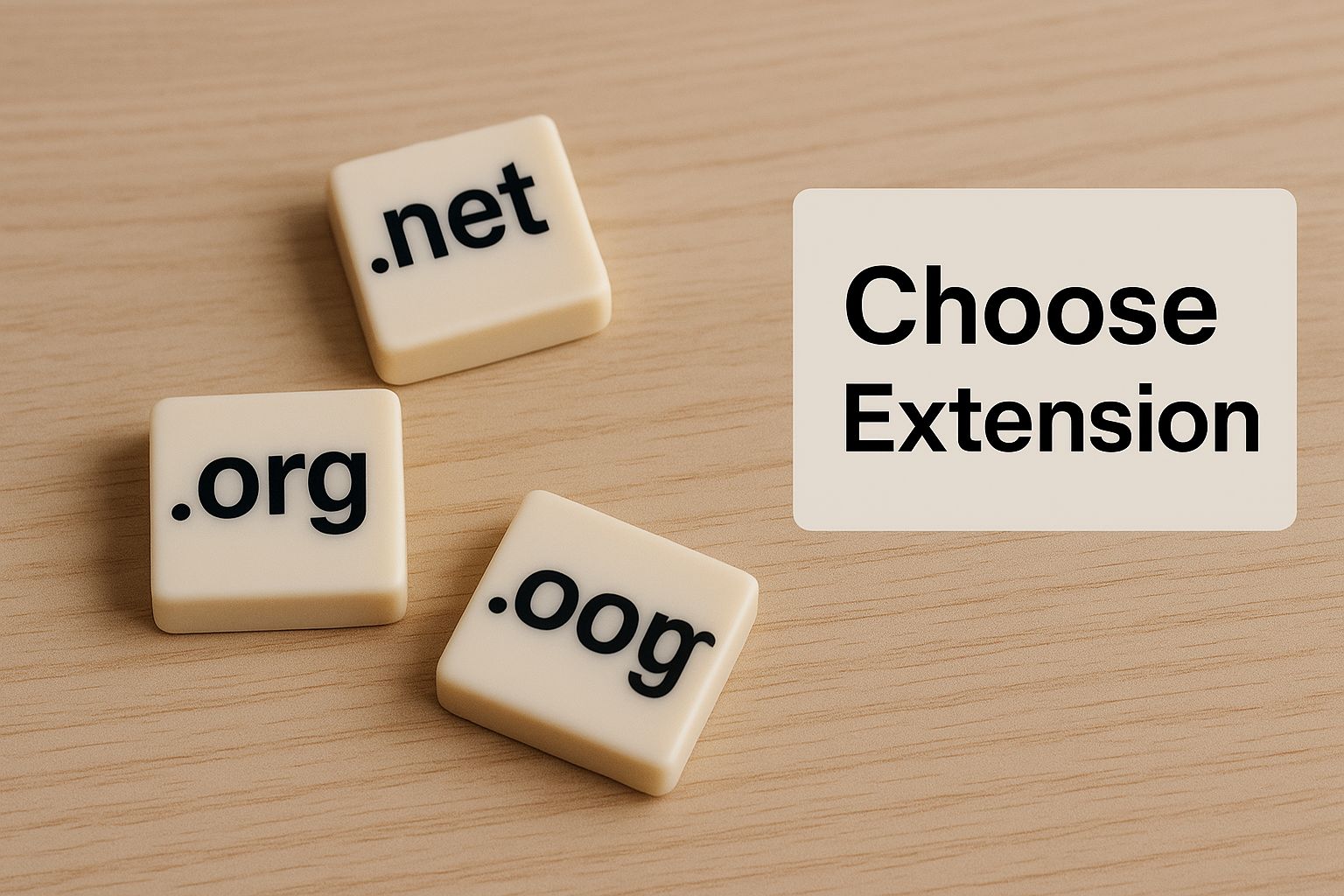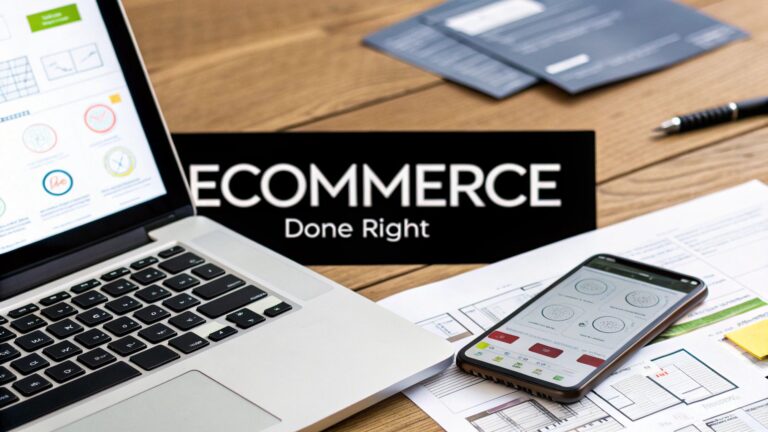Picking the right domain name is a balancing act. You're juggling your brand identity with something that's simple enough for people to remember. The best ones are short, a breeze to spell, and don't rely on clumsy hyphens or numbers. For a UK audience, aiming for a .com or .co.uk extension is usually a smart move to build that initial trust.
Why Your Domain Name Is Your Most Important Digital Asset

It’s easy to think of a domain as just another line on your to-do list, but it’s so much more than a simple web address. It’s your digital shopfront. It's the first handshake you offer a new customer. And frankly, it’s the cornerstone of your online credibility.
This single choice has a huge knock-on effect on how potential customers in the UK will see your business and, crucially, how easily they'll find you in the first place. A great domain name establishes authority from the get-go and becomes a powerful ally in all your marketing efforts down the line. It's a core component of your brand's identity and, as this ultimate guide to branding strategy explains, it acts as the anchor for your entire online world.
The Foundation of Your Brand
So, what makes a domain name truly effective? I’ve found it always comes down to a few key things.
A strong domain should be:
- Clear and Concise: It needs to give visitors an instant clue about who you are or what you offer.
- Memorable and Easy to Spell: Here's a good rule of thumb: if you have to spell it out over the phone, it’s probably too complicated.
- Aligned with Your Brand: Your domain has to genuinely reflect your business’s personality and what you stand for.
Getting this right really matters. Just look at the numbers. Out of nearly 372 million domains registered across the globe, the renewal rate sits at 75.5%. That means roughly one in four domains are eventually let go, often because they were poorly chosen, ineffective, or just plain forgettable.
Your domain isn't just a technical requirement; it's a strategic business decision. It's the permanent address for your brand on the internet, influencing everything from click-through rates to customer recall.
Choosing wisely sets the stage for everything that follows, from your branding to your search engine optimisation. For new ventures, this is a pivotal step when building your first business website as a start-up. A well-chosen domain can transform a simple URL into your most valuable digital asset.
Practical Brainstorming Techniques for Your Domain

We've all been there. Staring at a blank screen, trying to pluck the perfect domain name out of thin air. It’s a frustrating spot to be in. The trick is to stop waiting for inspiration and start using some proven methods to generate real, memorable contenders.
One of the first things to figure out is your overall strategy. Are you aiming for a brandable name or a keyword-rich one? A brandable name like Deliveroo is catchy and unique, but it takes time and marketing spend to build recognition. On the other hand, something like norfolkroofrepairs.co.uk tells both customers and search engines exactly what you do, which is a massive head start for local service businesses.
I've often found that the most effective domains sit somewhere in the middle. Think about blending a creative, unique word with a more descriptive one. For example, if you were starting a sustainable clothing brand, you could combine a name like "Ember" (which suggests warmth and passion) with "Threads" to get emberthreads.co.uk. It’s both memorable and clear.
Kickstarting Your Idea Generation
Feeling stuck? Don't be afraid to use a few tools to get the ball rolling, but treat them as a starting point, not the final answer. Even something as simple as a thesaurus can be surprisingly helpful. A basic keyword like "fresh" can be spun into more interesting options like "crisp," "vivid," or "pure," opening up completely new directions for your name.
A great domain name should feel intuitive. If you have to explain it, it’s probably not the right one. The goal is to find a name that sounds natural when said aloud and looks clean when written down.
Sometimes, a little automated help can spark an idea you hadn't considered. An ecommerce store business name generator can be great for exploring different word combinations and possibilities.
Here are a few practical exercises I always recommend to clients:
- Mind Mapping: Grab a pen and paper. Put your main product or service in a circle in the middle. Now, branch out with related concepts, feelings, and customer benefits. A coffee shop, for instance, might branch out to words like "roast," "aroma," "haven," or "daily."
- Word Association: First, write down five adjectives that capture your brand's personality (e.g., trustworthy, modern, speedy). Next, list five nouns directly related to what you sell. Now, start mixing and matching them to see if any combinations resonate.
- Use Your Location: Adding your city or region can be a brilliant move, especially if you’re a service-based business targeting a local area. CambridgeCycleHire.co.uk leaves no doubt about what it offers and where.
The goal at this stage isn't to find the one perfect name. It's to generate a long list of possibilities. You can worry about whittling it down based on brand fit and availability later.
Choosing the Right Domain Extension for Your UK Business
Those few letters after the final dot in your web address—the Top-Level Domain, or TLD—might seem like a tiny detail, but they pack a serious punch. They send a huge signal to your customers and to search engines about who you are and where you operate. For any business with a UK focus, this isn't just a technical box-ticking exercise; it’s a strategic move that shapes your brand and your local search performance right from the start.
Choosing the right TLD is fundamental to picking a domain name that works. It's all about building instant trust and showing you're relevant to a UK audience. According to Nominet, the official registry for UK domains, there were roughly 8.4 million .co.uk domains registered as of July, proving it's still the nation's firm favourite.
The image below gives you a great visual breakdown of how different extensions serve different needs, helping you see where your business fits in.

As you can see, while a global extension like .com has its place, the best choice really depends on your specific business goals.
UK-Centric vs. Global Extensions
When you're operating in the UK, you have a few core options that each send a slightly different message. Making the right call here is crucial.
The go-to choice for years has been .co.uk. It’s the digital equivalent of a local high street address—familiar, trusted, and it instantly tells customers you’re a British company. If your main market is right here in the UK, you honestly can't go wrong with a .co.uk. It’s a safe, powerful bet for building a strong national presence.
More recently, the shorter, snappier .uk has gained traction. It’s clean, modern, and memorable. While it hasn't quite overtaken its older sibling in terms of public recognition just yet, it's a solid, forward-thinking choice for a contemporary brand.
My two cents: If your budget allows, grab both the
.co.ukand the.ukversions of your domain name. You can pick one to be your primary address and just redirect the other one to it. It’s a simple, smart way to protect your brand from copycats and future-proof your online turf.
And then we have the global titan: .com. If you have grand plans to sell beyond the UK's borders, a .com is pretty much non-negotiable. It's recognised the world over and doesn't tie you to any single country. For a purely UK-focused business, though, it can sometimes feel a bit impersonal and miss out on the local credibility that .co.uk delivers so well.
Popular UK Domain Extensions at a Glance
To make this even clearer, here’s a quick comparison of the most common TLDs you’ll be considering for a UK-based business.
| Extension | Primary Use Case | Audience Perception |
|---|---|---|
| .co.uk | UK-based commercial businesses and services. | Established, trustworthy, and quintessentially British. |
| .uk | A modern alternative for any UK entity. | Sleek, contemporary, and forward-thinking. |
| .org.uk | UK-based non-profits and charitable organisations. | Reputable, community-focused, and not for profit. |
| .com | Businesses with a global or international audience. | Universal, professional, and globally recognised. |
Ultimately, the extension you choose anchors your online identity. Think carefully about where your customers are and what message you want to send before you make your final decision.
Don't Despair When Your First Choice is Gone — Get Creative
So, you’ve put your heart into brainstorming the perfect name, only to find your .co.uk or .com is already snapped up. It’s a frustrating moment, I know, but this isn't a dead end. In fact, it's often a blessing in disguise—an opportunity to find a domain that’s shorter, more memorable, and far more descriptive.
The world of domains is so much bigger than just the classics. We're now seeing a huge range of industry-specific extensions, often called generic top-level domains (gTLDs), that can instantly tell people what you do. For instance, a tech startup in Manchester might go for .tech, while a photographer could find .art or .photo to be a perfect fit.
When you think about it, these extensions turn your entire web address into a powerful branding statement. A name like peakfitness.training is so much clearer and more direct than a clunky alternative like peakfitnesstrainingonline.co.uk. It’s punchy and sets the right expectation before anyone even clicks the link.
Find Your Niche with a Modern TLD
This isn't just some fringe trend; it's a significant shift in how people are naming their businesses online. Registrations for these new gTLDs shot up by 13.5% in just one year, reaching a massive 37.8 million names worldwide. If you want to dive deeper into the numbers, these domain name statistics from hostinger.com show just how fast this area is growing.
Let’s look at a few real-world examples to see how this works in practice:
- A retailer could switch from
sarahsflowersonline.co.ukto the much cleanersarahsflowers.shop. It’s shorter and tells customers immediately that they can buy something. - A consultant could register
davidlloyd.consulting. It just sounds more professional and authoritative than a generic alternative. - An eco-conscious brand using
greenfuture.ecopowerfully reinforces its core values right there in the address bar.
Choosing a modern gTLD isn't just a plan B. It's a strategic branding move that lets you carve out a unique identity in a crowded space, turning a frustrating search into a real advantage.
By opening your mind to these creative extensions, you can often land a domain that’s highly relevant and memorable—one that connects with your audience from the very first click.
Your Pre-Purchase Domain Checklist
You've brainstormed, researched, and finally landed on a domain name that feels just right. Hold on. Before you hit that 'buy now' button, it’s worth taking a moment for a few final checks. A little due diligence at this stage can save you from some serious headaches and even legal trouble down the road. Think of this as your final pre-flight inspection.
Check for Trademark Conflicts
First things first, you absolutely must conduct a trademark search. This isn't just a suggestion; it’s a crucial step to make sure you aren’t accidentally stepping on another company's brand. For anyone operating in the UK, the government's Intellectual Property Office website is your starting point.
Their search tool is straightforward and can quickly tell you if your chosen name is already a registered trademark.
Getting this wrong could mean a forced rebrand or a costly legal battle. It’s a five-minute check that can protect your business for years to come.
Dig Into the Domain’s Past
Next up, play detective and investigate the domain's history. A name that looks perfectly clean on the surface might be hiding a shady past. Has it been used for spam? Was it penalised by Google?
Tools like the Wayback Machine are fantastic for this. They let you see snapshots of what the website looked like in previous years. A quick look can reveal if the domain was once a low-quality affiliate site or something worse, which could seriously hobble your SEO efforts right out of the gate.
It's a bit like doing a history check on a used car. You wouldn't buy a car without knowing if it's been in a major accident, so don't register a domain without checking its digital past.
A Few Final Practical Checks
With the big legal and historical hurdles cleared, run through these last-minute practical tests:
- Secure Your Socials: Is the name available on key platforms like Instagram, Facebook, and X? Grabbing matching social media handles is vital for building a consistent, recognisable brand.
- The "Say It Aloud" Test: Tell a friend or colleague the name. Don't spell it out. Can they easily understand it and spell it back to you? If there's any confusion, you’re setting yourself up for a lot of frustration.
- Look for Hidden Meanings: Read the name one last time, slowly. Sometimes, when you push words together, they create an unfortunate or unprofessional new word you didn't see at first. Think ‘therapistfinder.com’ vs. ‘the-rapist-finder.com’. A hyphen can make all the difference!
Once you’ve ticked these boxes, you can finally register your domain with confidence. This is also the perfect time to sort out your web hosting. Our guide on the 7 best web hosting options for small UK businesses can point you in the right direction. Taking these simple steps ensures your new domain is a strong, clean foundation for whatever you're building.
Common Questions About Choosing a Domain Name
Even after doing all the groundwork, you'll probably have a few nagging questions before you commit. That's completely normal. Let's tackle some of the most common ones I hear from clients, so you can finalise your choice with complete confidence.
Should I Register Multiple Domain Extensions?
If you've got the budget, my answer is almost always yes. Think of it as a defensive move. By snapping up both the .co.uk and the .com versions of your name, you immediately block a competitor from setting up shop with a similar address and potentially siphoning off your traffic.
It’s a simple, effective way to protect your brand. You can just have the extra domains (like the .com) redirect straight to your main .co.uk site. It’s a small price to pay for that kind of brand security and peace of mind.
What if My First-Choice Domain Name Is Taken?
It happens to the best of us. First, it's worth checking if the domain is listed for sale on a marketplace, but prepare yourself—it will likely come with a hefty price tag.
If buying it isn't an option, it’s time to get creative. Try adding a simple verb that makes sense for your business, like getyourbrand.co.uk. Another great trick is to add your location if it's relevant, for example, yourbrandbristol.co.uk.
A word of warning, though: steer clear of hyphens and numbers. They're a nightmare for people to remember and even harder to share by word of mouth, which undermines the whole point of a good domain.
A taken domain isn’t a roadblock; it's a nudge to think more creatively. I've often seen clients land on a second or third idea that was far more unique and brandable than their original one.
How Long Should My Domain Name Be?
With domain names, shorter is almost always better. You should be aiming for something under 15 characters if you can manage it. A concise name is just easier for people to recall, type correctly, and share.
Long, complex domains are an open invitation for typos and mistakes, which translates directly into lost visitors and frustrated potential customers. A memorable domain is a foundational piece of your digital marketing and plays a real role in learning how to rank higher on Google. The easier you make it for people to find you, the better.
At Ibertech Solutions Limited, we specialise in helping businesses like yours build a powerful online presence from the ground up, starting with the perfect domain. Let's build your brand's digital home together.





